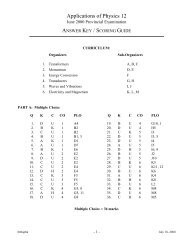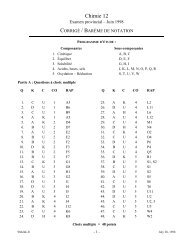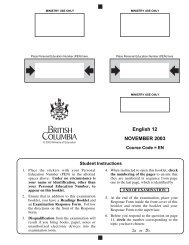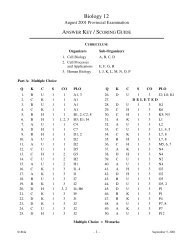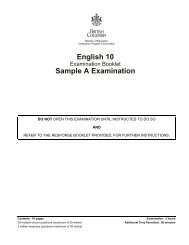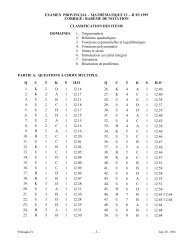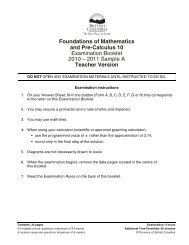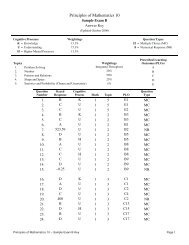ENGLISH 12 - QuestionBank.CA
ENGLISH 12 - QuestionBank.CA
ENGLISH 12 - QuestionBank.CA
Create successful ePaper yourself
Turn your PDF publications into a flip-book with our unique Google optimized e-Paper software.
PART B: READING COMPREHENSIONINSTRUCTIONS:Read the following passage and answer the questions on pages 4 to 7 of theexamination booklet.Adapted from Bugs of Wonderby Margaret Munro1 One lives in a solution so salty it would make you gag. Another thrives at temperatures hotenough to kill most other living things. “They’re perfectly happy,” says biochemist PatrickDennis of the microbes in a toasty 80-degree Celsius vat in his University of BC lab.2 The heat-loving microscopic organisms, like their salt-loving cousins in a flask down the hall, aresome of the stranger members of the ever-expanding microbial family that is shaking up long-heldassumptions about life, its origin and its resilience.3 “We’re starting to see microbes in places that are just unbelievable,” says UBC microbiologistBob Hancock, rattling off some of the improbable locales. “They seem to defy just abouteverything we know about life.”4 Tiny organisms have been found laying down gold deposits in South America; surviving on a dietof basalt rock several kilometres underground in Sweden; residing in scalding deep-sea vents offthe BC and Washington coast; living on frigid rocks in the Antarctic.5 They’ve “put the lie” to the name of the Dead Sea, which scientists now realize can teem withinvisible life. Microbes may even be growing on distant planets, according to geophysicistsstudying tantalizing signs of life on a meteorite from Mars.6 It’s possible—but impossible to prove without a better extraterrestrial sample—that life on Earthstarted when contaminated dust or rock dropped in from space. Such microscopic aliens may,according to evolutionary biologists, have planted the microbial seeds that over the eons branchedinto the tree of life found on Earth today.7 Even without such space invaders, the tree has recently been shaken to its roots.8 A vast family of new microorganisms, which has been named archaea, has been found living ineverything from the backyard garden to the deep sea floor. Archaea are so different from bacteriathat biologists have decided they deserve their own branch on the tree of life.9 Scientists are also realizing just how critical a role microbes played in shaping the planet: theygave the atmosphere its oxygen two billion years ago; they were critical to the formation of thebiosphere; they helped shape many energy and mineral deposits by concentrating everything fromgold to oil.10 A Canadian team has concluded that microbial handiwork laid down the famed Serra Pelada goldfield in the Amazon jungle. The scientists say the rich lode—more than 100 tonnes—wasproduced not by the accepted mechanisms of ore formation but by swarms of microbes that overmillions of years concentrated the gold from jungle soils and rivers and rocks.- 1 -OVER




